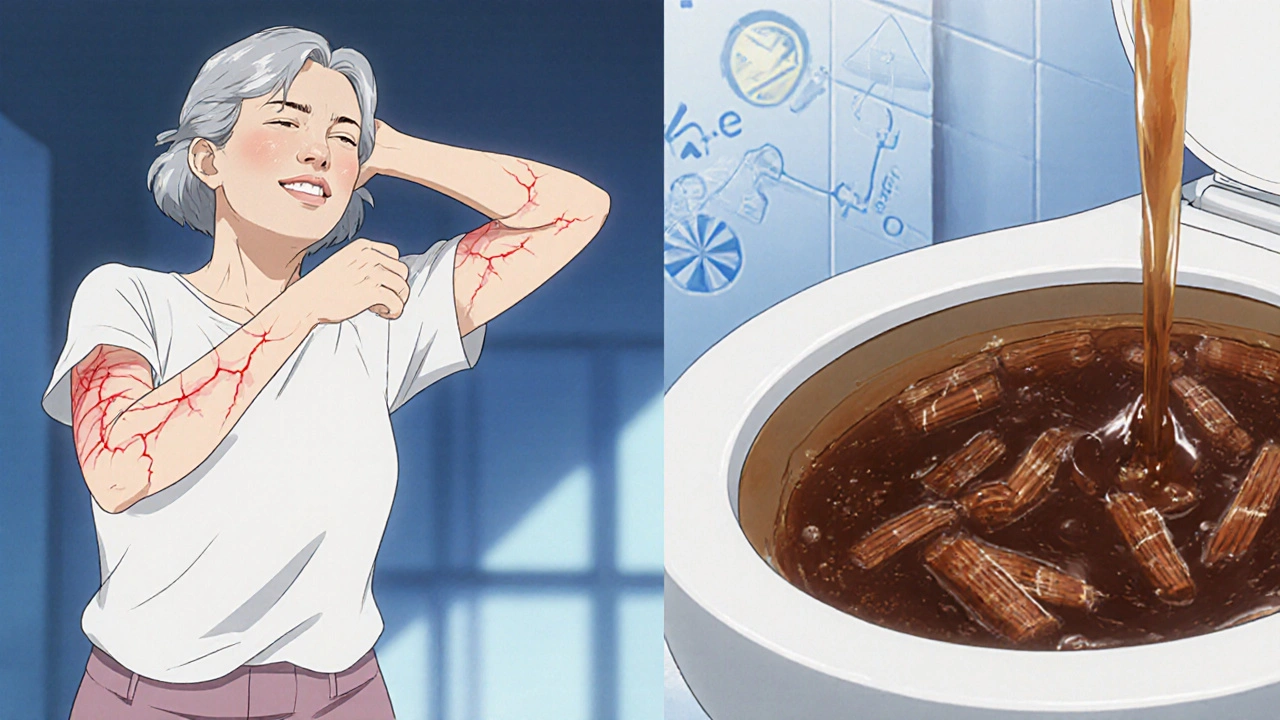Statin-Grapefruit Juice Interaction Checker
Check Your Interaction Risk
This tool checks the risk of muscle damage when taking statin medications with grapefruit juice. Based on your specific statin and consumption, it provides risk assessment and recommendations.
Why Grapefruit Juice Can Be Dangerous With Simvastatin
Many people drink grapefruit juice because it’s tart, refreshing, and full of vitamin C. But if you’re taking simvastatin - a common cholesterol-lowering drug - that glass of juice could be putting your muscles at serious risk. The problem isn’t the juice itself. It’s what happens when grapefruit juice meets simvastatin in your body.
Simvastatin, sold under the brand name Zocor, is broken down in your gut by an enzyme called CYP3A4. This enzyme helps limit how much of the drug enters your bloodstream. Grapefruit juice contains chemicals called furanocoumarins, mainly bergamottin and 6',7'-dihydroxybergamottin. These chemicals shut down CYP3A4 in your intestines. When that happens, your body can’t break down simvastatin the way it should. Instead of 10% of the drug entering your blood, up to 90% might get through. That’s a 16-fold increase in exposure, according to a 2004 study in Circulation.
This isn’t just a small uptick in side effects. It’s a direct path to muscle damage. When too much simvastatin builds up, it can cause myopathy - a condition where muscles hurt, weaken, or break down. In the worst cases, this leads to rhabdomyolysis, where muscle tissue spills into your bloodstream and can crash your kidneys. The FDA warns this can lead to kidney failure and even death.
How Much Grapefruit Juice Is Too Much?
You don’t need to give up grapefruit juice entirely - but you need to know the line between safe and dangerous.
The FDA says consuming more than 1.2 liters (about five 8-ounce glasses) of grapefruit juice per day is the threshold for serious risk. That’s not a daily habit - that’s a full pitcher, every day. At that level, CYP3A4 in your gut is suppressed by nearly half. Even one glass a day can raise simvastatin levels by 30-40%, but most people won’t have symptoms unless they hit that 1.2-liter mark.
But here’s the catch: you can’t predict who will react badly. One person might drink a glass daily for years with no issues. Another might have muscle pain after just two glasses. The FDA’s Dr. David J. Graham says we simply can’t tell who’s at risk. That’s why many doctors recommend avoiding it altogether, especially if you’re older, have kidney problems, or take other medications that also interact with CYP3A4 - like amiodarone or certain blood pressure pills.
Not All Statins Are the Same
If you’re on simvastatin and love grapefruit, you might wonder: can I just switch to a different statin? The answer is yes - and it’s often the smartest move.
Simvastatin and lovastatin are the most affected by grapefruit juice. Both are heavily processed by CYP3A4. Atorvastatin (Lipitor) has a moderate interaction - up to a 3.3-fold increase in levels. But pravastatin (Pravachol) and rosuvastatin (Crestor)? They’re safe. They don’t rely on CYP3A4 to get broken down. Instead, they’re cleared by other pathways in the liver and kidneys.
That’s why the FDA only lists simvastatin and atorvastatin in its grapefruit warnings - not pravastatin or rosuvastatin. If you’re on simvastatin and regularly drink grapefruit juice, talk to your doctor about switching. It’s not a big change in treatment. It’s a big change in safety.

What Symptoms Should You Watch For?
Myopathy doesn’t always come with warning signs. But if you start feeling any of these, stop drinking grapefruit juice and call your doctor right away:
- Unexplained muscle pain, especially in your shoulders, thighs, or lower back
- Muscle weakness that makes it hard to climb stairs or lift things
- Dark, tea-colored urine - that’s a sign your kidneys are being flooded with muscle breakdown products
- Fatigue that doesn’t go away
- Stomach pain or nausea without a clear cause
These symptoms can show up within days of mixing grapefruit juice with simvastatin. They can also creep in slowly. Don’t wait for the pain to get worse. If you’re on simvastatin and notice muscle discomfort, it’s not just soreness from the gym. It could be your muscles breaking down.
What About Other Citrus Fruits?
Not all citrus is dangerous. Seville oranges (used in marmalade) and pomelos also contain furanocoumarins and should be avoided. But regular orange juice? It’s safe. So are tangerines, lemons, and limes.
Many people think “citrus = bad,” but that’s not true. The danger comes from specific chemicals found only in grapefruit and a few close relatives. A 2022 Mayo Clinic survey found that 63% of statin users mistakenly thought even small amounts of any citrus were risky. That’s unnecessary fear. You can still enjoy your morning orange juice - just leave the grapefruit out.

How Long Does the Effect Last?
Some people think if they skip grapefruit juice for a day, they’re safe. That’s not how it works.
The furanocoumarins in grapefruit juice don’t just pause CYP3A4 - they destroy it. Your body needs 3 to 7 days to grow new enzymes to replace the ones that were shut down. So even if you drank grapefruit juice on Monday, and you take simvastatin on Thursday, you’re still at risk.
This is why timing doesn’t fix the problem. Waiting 4 hours between juice and medication? It doesn’t help. The enzyme damage is long-lasting. The only reliable way to avoid the interaction is to stop drinking grapefruit juice completely while on simvastatin - or switch to a different statin.
What Should You Do If You’re on Simvastatin?
Here’s a simple action plan:
- Check your prescription label. If it says “avoid grapefruit juice,” pay attention.
- Ask your pharmacist or doctor: “Is this statin safe with grapefruit?”
- If you drink grapefruit juice regularly, ask if switching to pravastatin or rosuvastatin is an option.
- Keep a log of any muscle pain or unusual fatigue - even if you think it’s nothing.
- Never assume you’re “fine” because you’ve never had side effects before.
Over 23 million Americans take simvastatin each year. That’s a lot of people who could be at risk without knowing it. The good news? This interaction is preventable. You don’t need to give up your health for a glass of juice.
What’s Next for Grapefruit and Medications?
Scientists are working on solutions. The University of Florida’s Citrus Research Center has developed a new grapefruit hybrid called UF Sweetie. It has 87% less of the dangerous furanocoumarins than regular grapefruit. In a few years, this could mean a safer fruit for statin users.
But until then, the safest choice is clear: if you’re on simvastatin, skip the grapefruit juice. Your muscles will thank you.


Comments
Just got prescribed simvastatin last week and was about to buy a big jug of grapefruit juice because it’s my favorite. Thanks for this post - saved me from a potential hospital trip. 🙏 Switching to orange juice now. Life hack: always check drug interactions before you drink anything weird.
The 16-fold increase stat is misleading. That study used concentrated extracts, not actual juice. Real-world data shows median increase is 2.8x, not 16x. Most people who get rhabdo are on high doses + other interacting meds. Don’t panic, just be aware.
I cannot believe people still drink grapefruit juice. It’s not just simvastatin - it interferes with over 85 medications. Blood pressure pills, antidepressants, even some allergy meds. The FDA has been warning about this since 2001. If you’re too lazy to read a medication leaflet, you deserve the consequences. I’ve seen patients die because they thought ‘natural’ meant ‘safe.’
Okay but let’s be real - the whole grapefruit thing is overblown by pharmaceutical companies to push more expensive statins. I’ve been drinking a glass daily with simvastatin for seven years and my CPK levels are perfect. My doctor even said my cholesterol is better than most people on Crestor. This fear-mongering about ‘muscle breakdown’ ignores that millions take this combo without issue. Also, why is pravastatin ‘safe’? Because it’s generic and the drug companies don’t make enough profit off it. Wake up.
I appreciate how thorough this is. Honestly, this is one of the clearest explanations I’ve seen on drug-food interactions. The part about CYP3A4 being destroyed, not just inhibited, is critical - most people think it’s a ‘wait a few hours’ thing. Also, the UF Sweetie hybrid? That’s actually exciting. Imagine a future where you can have your grapefruit and take your statin too. Maybe we’ll get a ‘Statin-Safe’ label on fruit one day. Until then, I’m sticking with oranges and rosuvastatin. And yes, dark urine = go to ER. No jokes.
I read this and immediately felt judged. Like, I’ve been drinking grapefruit juice since I was 16 and now you’re telling me I’m one glass away from kidney failure? I don’t have kidney problems. I’m 32. I work out. I’m fine. Also, why are you assuming I’m too stupid to read a label? Maybe I did. Maybe I just don’t care. Your post is emotionally manipulative.
Hey George, I get it - you’re young, healthy, and feel invincible. I was you ten years ago. I drank grapefruit juice with simvastatin for two years. No symptoms. Then one morning, I couldn’t lift my coffee cup. Turns out, my muscles were dissolving. Took me months to recover. I didn’t have warning signs. No pain until it was too late. I’m not trying to scare you. I’m just saying - your body doesn’t always tell you when it’s breaking down. It’s not about being stupid. It’s about being smart before it’s too late. I switched to rosuvastatin. Still drink orange juice. Still alive. Still lifting coffee. 🤝
This is all part of the Big Pharma agenda. The FDA’s warning? Manufactured. The CYP3A4 mechanism? Overstated. Grapefruit juice has been consumed for centuries. The real issue is that simvastatin was designed poorly - and now they want you to pay more for ‘safer’ alternatives. Also, why is the University of Florida developing a new grapefruit? Because they’re owned by pharmaceutical lobbyists. I’ve seen the documents. This isn’t science. It’s profit.
Fascinating how the public conflates correlation with causation. The cited 2004 Circulation study had a sample size of 12. The FDA’s 1.2-liter threshold is based on extrapolated pharmacokinetic models, not clinical outcomes. Real-world incidence of rhabdomyolysis from grapefruit is less than 0.003%. To suggest universal avoidance is medically unsound. I’m a biochemist. I know the pathway. You’re overreacting.
Ive been on simvastatin for 5 yrs and drink grapefruit juice every day and i feel great so this is all hype. My aunt died from a statin but she was on 80mg and had liver disease so dont blame the fruit. Also why is everyone so scared of natural things? Maybe the drug is the problem not the juice. And why do doctors always want to switch you to more expensive stuff? #grapefruitisfine